The Art of Science—Versailles at the Science Museum, London
Have you ever wondered how it would feel to witness the grandeur and opulence of the 18th-century French court? Then you might want to go to London.
Edoardo Cesarino 19 December 2024
As Expo 2020 in Dubai is coming to an end (October 1st, 2021–March 31st, 2022), it is still worth seeing some of the most amazing architectural structures built for this occasion. Additionally, in some of the pavilions, you can be part of various art+tech experiences and immerse yourself in this world of top-class innovative solutions and interesting exhibitions.
For the last 170 years World Expos (including Expo 2020) have provided a space to experience some of the most prominent innovations that have shaped the world. Dubai 2020 aims to continue this tradition and showcase the greatest technologies that have emerged around the globe.
It was originally scheduled for October 20th, 2020 to April 2021, but unfortunately had to be postponed due to the COVID-19 pandemic. However, the organizers decided to keep the name Expo 2020 for marketing and branding purposes.
The most famous historical structures such as the Eiffel Tower in Paris, the Crystal Palace in London, or the Space Needle in Seattle were inventions created for the World Exhibitions. Expo 2020 is the first exhibition held in the Middle East and South Asia. Al Wasl Plaza – the world’s largest unsupported dome – will join the long list of historical architectural structures that are the symbols of World Expos.
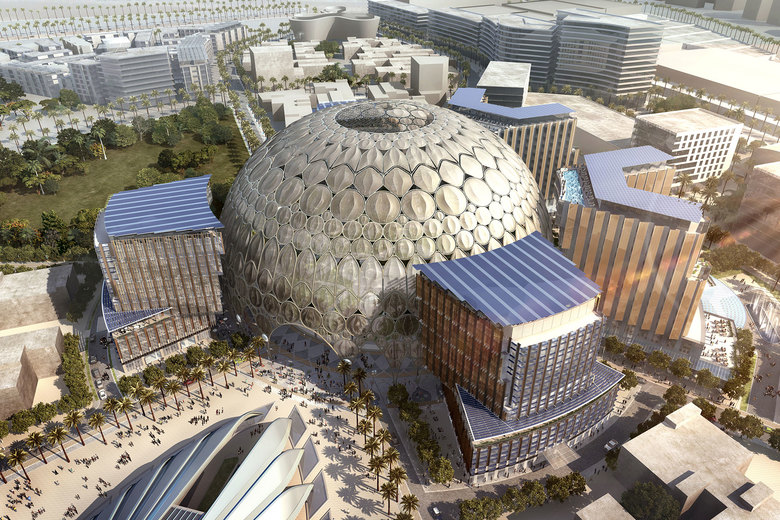
Office for Visual Interaction (OVI), Al Wasl Plaza, Expo 2020, UAE. World-architects.
The main theme of the event is Connecting Minds, Creating the Future. You can visit 192 country pavilions as, for the first time in World Expo history, every participating country will have its own exhibition place. It is divided into three districts: Opportunity District, Mobility District and Sustainability District.
Below you can find my very subjective guide to Expo 2020, concentrating mostly on art and technology elements that you can experience there. However, I have also found some inspirational pavilions which showed their culture and tradition in very creative ways without a huge demand for technology.
The UK pavilion is my absolute number 1 and very much based on technology. Its theme is Innovating for a Shared Future and the whole idea is inspired by one of Stephen Hawking’s final projects, Breakthrough Message. The UK pavilion invites viewers to ask themselves a question about what message we would communicate to express ourselves as a planet in case we meet other advanced civilizations in space.
So how does it work? On the front side of the pavilion you can see various words that are a collective message that the audience helps to create. When you enter the pavilion, you write down a word on a tablet – my word was peace. Next, artificial intelligence creates a passage for a poem with the written word. This word can be later seen on the façade of the building and the passage will become part of the poem written by AI. After the Expo 2020 is finished this will be the longest poem in the world written by artificial intelligence.
ALIF – the Mobility Pavilion is a great experience to participate in. It was designed by the award-winning Foster + Partners group and features the world’s largest passenger elevator which can transport more than 160 people at a time. Its name comes from the first letter of the Arabic alphabet and symbolizes the beginning of progress and new horizons.
The exhibition tells a story of mobility starting with nine-meter-tall historical giants of mobility whose innovations helped navigate the world and paved the way for the technology we use today. It was designed and built by New Zealand’s Weta Workshop, a special effects firm that has won five Academy Awards and has worked on films such as Blade Runner 2049, Avatar, and The Lord of the Rings and The Hobbit trilogies.
Later on the passage takes us on a tour of the history of travel and shows us how mobility has driven the development of humankind. At the end we can step into the future with air taxis, AI, big data, and robotics that will evolve our cities and that will continue to change the way we think about mobility on a bigger scale.
This pavilion takes you on a journey through authentic Saudi Arabian culture, rich heritage, natural diversity, and art tech immersive experiences which show the country’s transformation and its future. It is the second largest pavilion at Expo 2020 and was designed by Boris Micka Associates. The pavilion is equipped with traditional exhibition techniques intertwined with state-of-the-art audiovisual installations.
The building has a fully animated LED mirror façade. In the daytime this glass façade creates a comforting shade over the waiting area. At the same time the large mirror reflects everything that is happening in front of the building. Later, at night, it becomes a gigantic screen catching the attention of passersby. Saudi Arabia made this space truly impressive with the longest interactive water feature in the world at 32 meters, the world’s largest LED mirror screen with 1,305.5 square meters, and the world’s largest interactive lighting floor with 8,500 LED lights.
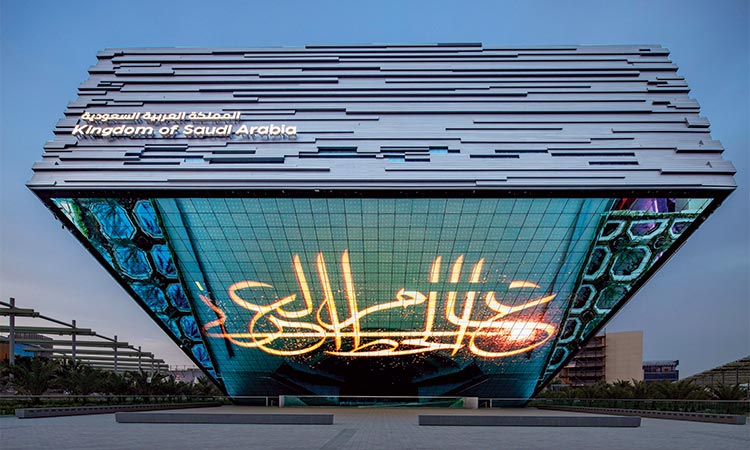
Boris Micka Associates, Saudi Arabia Pavilion, Expo 2020, UAE. Gulf Today.
This stunning building was designed by world-renowned architect Dr. Santiago Calatrava. This is the largest pavilion at Expo 2020 and its shape is influenced by the falcon. With 28 movable wings, the UAE Pavilion’s roof can spread its wings to harvest energy through integrated photovoltaic panels.
It also meets LEED Platinum sustainable building standards. Inside you can be part of a multi-sensory visitor experience which tells a story of the UAE, from its ancient roots to its transformation into a 21st century nation.
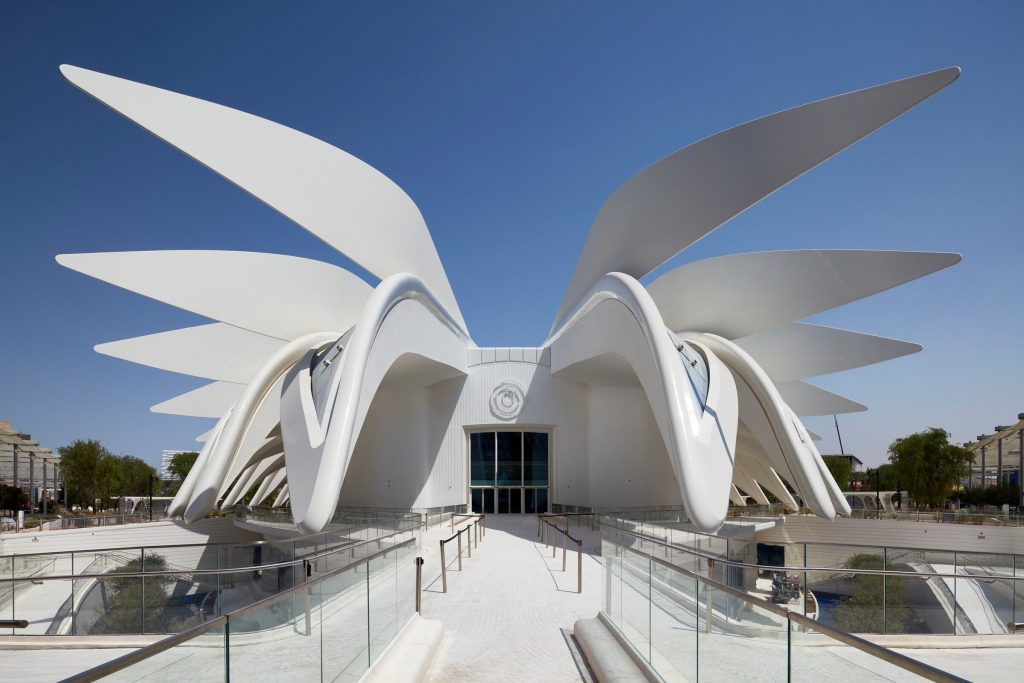
Santiago Calatrava, UAE Pavilion, Expo 2020, UAE. Archello.
The idea of the entrance to the building comes from traditional Korean houses that have a “Madang” – an open space used for social gatherings and family interactions. This concept has been used in the Korean Pavilion in the form of a central space that hosts cultural performances, events, and K-pop concerts.
The three most innovative things in the buildings are: its façade that constantly changes through the course of the day, a kinetic installation that interacts with its audience, and the vertical cinema. Moreover, visitors can enjoy a mobile-guided Augmented Reality tour through the four ramps and at the same time admire the best view of Expo 2020.
The only thing that I did not like was that the AR experience took place in full sun and some things were not clearly visible due to it. I felt it was a pity that no one had thought about this before as user experience for me is the most important part of designing activities for audiences.
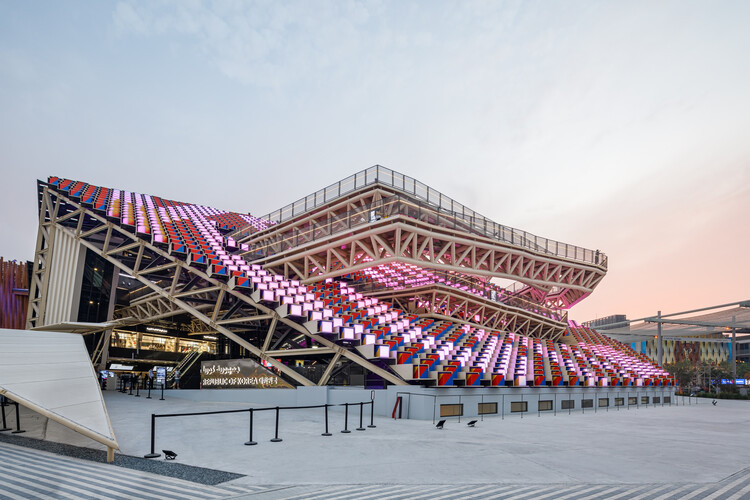
Mooyuki Architects, South Korea Pavilion, Expo 2020, UAE. ArchDaily.
The most beautiful pavilions for me were those of Pakistan, Poland, and Jamaica. Each of them displayed their culture and heritage in a creative way.
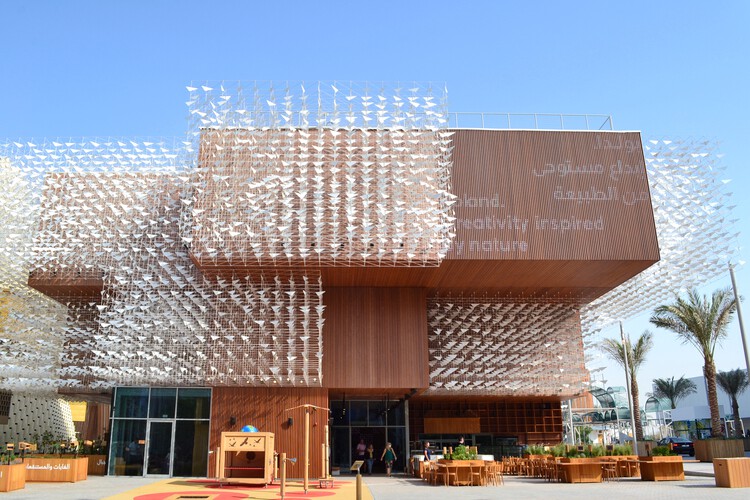
WXCA, Poland Pavilion, Expo 2020, UAE. ArchDaily.
Poland’s pavilion is a tree-like wooden structure with a kinetic sculpture that symbolizes the large-scale migration of birds from Poland to the Arab world. Inside the building you can find the Polish Table. This is an interactive, multimedia art installation created out of over 100 wooden blocks and special modules made of materials that are characteristic of Poland such as glass, silver and copper, steel and ceramics. When you speak loudly to the special speakers located at the table, your voice may turn into light and light up the pavilion.
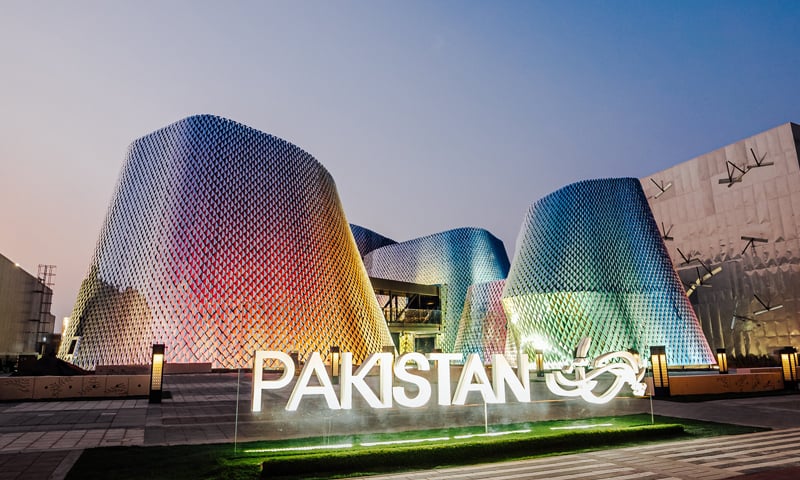
Rashid Rana, Pakistan Pavilion, Expo 2020, UAE. DAWN.
The Pakistani pavilion, glittering in the sun of Dubai, can be seen from far away and once it catches your attention, you just need to come closer and admire its amazingly colorful façade. It is the work of Rashid Rana entitled Unity of All that Appears. It comprises 24,000 seemingly identical, yet in fact exceptional small pieces, fractionally different from each other in size and color.
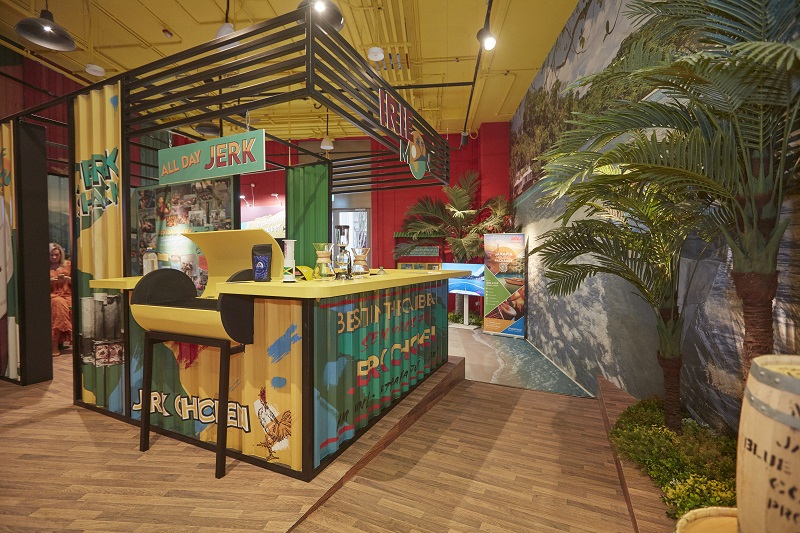
Jamaica Pavilion, Expo 2020, UAE. Construction Week.
The Jamaican pavilion takes you back to the times of Bob Marley. The atmosphere of a street party among shipping containers makes you want to dance and sing to the sounds of the best reggae artists. You can truly immerse yourself in a mixture of colors, rhythm, and art.
The current Expo 2020 will transition into the so-called District 2020 when the event ends in March 2022. District 2020 will be a new urban development in the UAE and its global innovation ecosystem will contribute to the growth of Dubai’s innovation through a focus on four key growth industries and disruptive technologies such as the Internet of Things (IoT), Artificial Intelligence (AI), big data, and blockchain.
At the site you can already see the “Master Plan” of District 2020. It includes residential areas, co-working spaces, and green spaces, eventually accommodating a population of 145,000 at full capacity.
DailyArt Magazine needs your support. Every contribution, however big or small, is very valuable for our future. Thanks to it, we will be able to sustain and grow the Magazine. Thank you for your help!